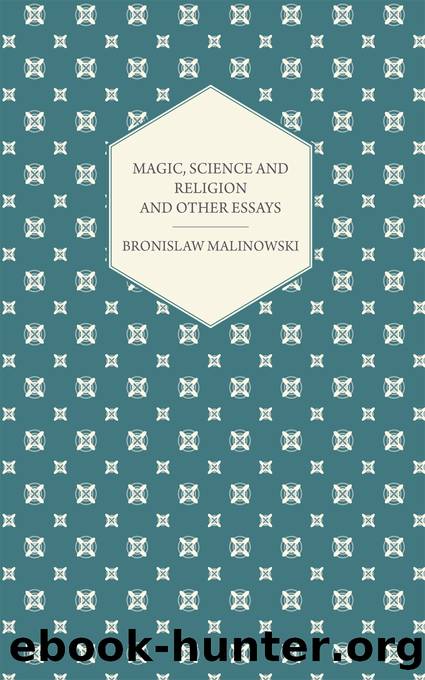Magic, Science and Religion and Other Essays (9781473393127) by Malinowski Bronislaw

Author:Malinowski, Bronislaw
Language: eng
Format: epub
Publisher: Lightning Source Inc
Published: 2013-02-14T16:00:00+00:00
V. CONCLUSION
Throughout this book I have attempted to prove that myth is above all a cultural force; but it is not only that. It is obviously also a narrative, and thus it has its literary aspectâan aspect which has been unduly emphasized by most scholars, but which, nevertheless, should not be completely neglected. Myth contains germs of the future epic, romance, and tragedy; and it has been used in them by the creative genius of peoples and by the conscious art of civilization. We have seen that some myths are but dry and succinct statements with scarcely any nexus and no dramatic incident; others, like the myth of love or the myth of canoe magic and of overseas sailing, are eminently dramatic stories. Did space permit, I could repeat a long and elaborate saga of the culture hero Tudava, who slays an ogre, avenges his mother, and carries out a number of cultural tasks.1 Comparing such stories, it might be possible to show why myth lends itself in certain of its forms to subsequent literary elaboration, and why certain other of its forms remain artistically sterile. Mere sociological precedence, legal title, and vindication of lineage and local claims do not lead far into the realm of human emotions, and therefore lack the elements of literary value. Belief, on the other hand, whether in magic or in religion, is closely associated with the deepest desires of man, with his fears and hopes, with his passions and sentiments. Myths of love and of death, stories of the loss of immortality, of the passing of the Golden Age, and of the banishment from Paradise, myths of incest and of sorcery play with the very elements which enter into the artistic forms of tragedy, of lyric, and of romantic narrative. Our theory, the theory of the cultural function of myth, accounting as it does for its intimate relation to belief and showing the close connection between ritual and tradition, could help us to deepen our understanding of the literary possibilities of savage story. But this subject, however fascinating, cannot be further elaborated here.
In our opening remarks, two current theories of myth were discredited and discarded: the view that myth is a rhapsodic rendering of natural phenomena, and Andrew Langâs doctrine that myth is essentially an explanation, a sort of primitive science. Our treatment has shown that neither of these mental attitudes is dominant in primitive culture; that neither can explain the form of primitive sacred stories, their sociological context, or their cultural function. But once we have realized that myth serves principally to establish a sociological charter, or a retrospective moral pattern of behavior, or the primeval supreme miracle of magicâit becomes clear that elements both of explanation and of interest in nature must be found in sacred legends. For a precedent accounts for subsequent cases, though it does so through an order of ideas entirely different from the scientific relation of cause and effect, of motive and consequence. The interest in nature, again,
Download
This site does not store any files on its server. We only index and link to content provided by other sites. Please contact the content providers to delete copyright contents if any and email us, we'll remove relevant links or contents immediately.
Becoming Supernatural by Dr. Joe Dispenza(8200)
Crystal Healing for Women by Mariah K. Lyons(7928)
The Witchcraft of Salem Village by Shirley Jackson(7257)
Inner Engineering: A Yogi's Guide to Joy by Sadhguru(6785)
The Four Agreements by Don Miguel Ruiz(6744)
The Power of Now: A Guide to Spiritual Enlightenment by Eckhart Tolle(5752)
Secrets of Antigravity Propulsion: Tesla, UFOs, and Classified Aerospace Technology by Ph.D. Paul A. Laviolette(5366)
The Wisdom of Sundays by Oprah Winfrey(5153)
Room 212 by Kate Stewart(5105)
Pale Blue Dot by Carl Sagan(4996)
Fear by Osho(4727)
The David Icke Guide to the Global Conspiracy (and how to end it) by David Icke(4706)
Animal Frequency by Melissa Alvarez(4461)
Rising Strong by Brene Brown(4450)
How to Change Your Mind by Michael Pollan(4355)
Sigil Witchery by Laura Tempest Zakroff(4237)
Man and His Symbols by Carl Gustav Jung(4130)
The Art of Happiness by The Dalai Lama(4125)
Real Magic by Dean Radin PhD(4120)
